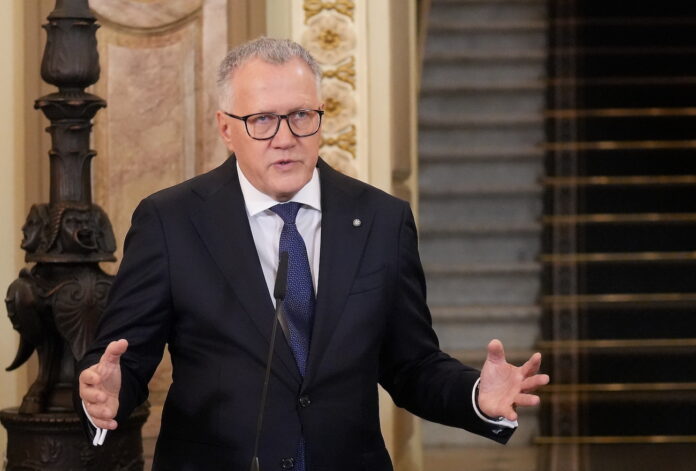Following negotiations with coalition partners, agreement has been reached on almost all submitted proposals, though “many technical details” still remain, Finance Minister Arvils Ašeradens (New Unity) told journalists on Friday.
The minister described the talks as constructive. “There are many different discussions,” Ašeradens said, stressing that work on technical details will continue. “Talks are taking place in a fairly constructive atmosphere — the big dramas have subsided,” he explained, adding that efforts are now focused on resolving the remaining differences in opinion.
Asked about the future of the government, Ašeradens said that the prospects for cooperation among coalition partners will become clear after the second reading of next year’s budget. “I have reason to hope that the government will continue to work,” he said, emphasising that he currently sees no grounds for the budget not being adopted in its final reading.
According to Progressives faction leader Andris Šuvajevs, coalition parties have agreed that the Society Integration Foundation (SIF) will not be eliminated. Instead, an audit of its functions and administrative costs will be carried out. “Overall, the SIF will continue its work,” Šuvajevs said.
The Union of Greens and Farmers (ZZS) had proposed liquidating the SIF
— an idea supported by several opposition parties.
Šuvajevs also noted that agreement has been reached to ensure that funding for the State Culture Capital Foundation (VKKF) will match the levels required by law, as proposed by the Progressives for the budget’s second reading.
He added that “several agreements” had also been reached on additional funding for healthcare, though details on amounts and targets will follow later.
Meanwhile, Minister of Economics Viktors Valainis (ZZS) told journalists that decisions on SIF’s future will be made after the functional audit, expected to conclude early next year. Following this, the government will evaluate which functions should be transferred to ministries, which should remain in place, and whether the institution’s name should be changed.
Valainis also said the coalition had reached compromises on continuing the oncology centre reconstruction,
providing additional investments for rural family doctors, and applying savings measures — including reducing Rail Baltica costs by €200–300 million.
Some proposals remain unresolved, but solutions will be sought outside the budget law, Valainis noted.
As previously reported, ZZS suggested reorganising the SIF, which could produce budget savings of €1.19 million. Of this, eliminating 14–15 positions would save €608,231, according to ZZS.
ZZS argues that programmes currently run by the SIF could instead be implemented by the Ministries of Welfare, Culture, and Education and Science, maintaining support for NGOs and the media while continuing activities to strengthen social cohesion.
However,
the proposal to abolish the SIF was sharply criticised by coalition partners New Unity and Progressives.
JV faction leader Edmunds Jurēvics called the idea “dangerous populism”, arguing that it targets Latvia’s civic society and will not be supported by his party. Šuvajevs likewise called the proposal a deliberate attack on civil society and labelled it populist.
Jurēvics has previously said that coalition MPs had reached a collegial agreement to first compile and discuss potential proposals within the coalition before submitting them formally, ensuring they contribute to improving next year’s budget.
Asked whether the coalition could support any opposition proposals, Jurēvics said that in previous years, not all opposition amendments were automatically rejected. However, he stressed that “any support for opposition proposals is possible only if there is consensus within the coalition,” adding that many opposition proposals are likely to be political rather than substantive.
The Saeima’s Budget and Finance Committee received over 450 proposals for the second and final reading of next year’s budget.
For 2026, consolidated general government revenue is projected at €16.064 billion, and expenditure at €17.945 billion.
Read also: BNN IN FOCUS | Is the SIF duplicating ministries? Expert reveals the political mechanism
